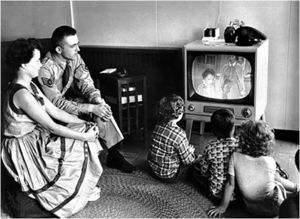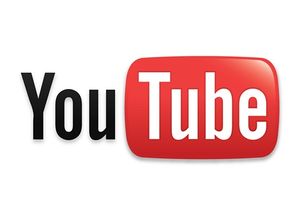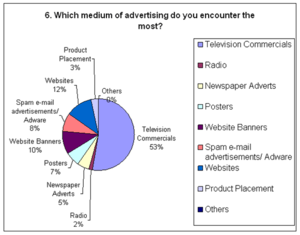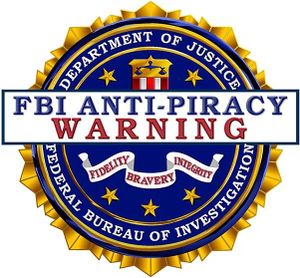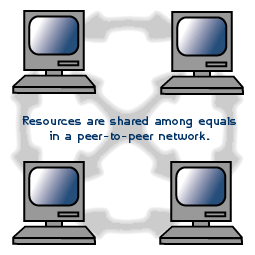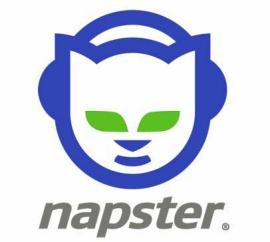The Accessibility of Television Shows and Videos
Contents
- 1 Group Members
- 2 Initial Project Statement
- 3 Argument
- 4 History
- 5 Users
- 6 Websites
- 7 Reasons for Allowing Access Online
- 8 The Writers Strike
- 9 Economic Issues
- 10 The Issue of Piracy
- 11 Digital Rights Management
- 12 Peer 2 Peer Programs
- 13 Notable Programs
- 14 IN2MOVIES
- 15 Legal VS Illegal P2P
- 16 Conclusion
- 17 References
Group Members
Emily Wuori
Paul Grenon
Dimas Andiputra
Initial Project Statement
The increasing accessibility of online videos and television shows has created monumental changes, both positive and negative, to viewers and key contributors to the entertainment market. While consumers see the benefits of convenience and inexpensive entertainment, producers are affected by the loss in revenues they are experiencing. Through this project, the advantages and disadvantages for all individuals will be discussed as well the effects on society as a whole.
Argument
After researching and observing the effects of easy accessibility of television shows and videos online, we feel that online downloading has had a negative impact on the majority of individuals. To begin, there is great concern to having young adults accessing content that is not age appropriate and that they are bypassing ratings that would technically exclude them from viewing some content. With the easy access of downloading also brings more people spending increasing amounts of time watching shows and videos alone and more frequently. It has become far too easy to access things to watch which has contributed to the rising statistic of the number of hours people spend watching TV and videos daily and weekly. Contributing to our argument is also the realization that a number of the websites and content accessed is pirated. There have been significant, negative economic effects on producers and companies involved with movie production such as the Motion Picture Association of America. Many companies and key contributors to the entertainment world have been affected with loss of revenue. Overall, we feel that downloading off the internet has become a technological advance that is hindering society as a whole.
History
In the past 50 years humans have witnessed a significant increase in the accessibility of watching television shows and movies. Not only has the convenience of watching what we like, when we like changed over the years, but also the social aspect has been altered. When television was first becoming popular, families watched TV together and made this time a family event. In the United States alone, it is estimated that there was approximately thirty-five thousand television sets in 1948. During the election in that year, individuals with televisions were able to watch the results unfold. Just this year, 2008, Canada and the United States watched on televisions as elections unfolded once again. However, in 1948 people would not have been able to predict that 50 years later people would be watching elections and other television programs on TV viewed on their computers. There were several estimations and projections that people would be able to in the future, shop from commercials on TV, and watch the latest news. As these aspects have inevitably come to be, there were no estimations 50 years ago that content from television and movies would be accessible on the internet. The content seen on TV was of appropriate nature and consisted of family friendly shows such as “I Love Lucy,” “Bonanza,” and “The Dick Van Dyke Show”. The wide variety of genres has unfortunately included inappropriate content and become a concern to the extent that movies and shows must have ratings such as, Parental Guidance and Restricted. This raises the concern of who is watching certain programs online. As the world has seen progressive changes in television, there has also become more variety and genres to suit everyone. With more selection to see to personal interests, each person in the family now watches TV at separate times and with recordable TV’s, people are able to watch the shows they like when it is convenient for them. Not only has watching TV shows online become popular but also viewing movies online.
Users
There are many users of illegal pirated videos and music. It is estimated that over 5 times as many video and television shows are watched illegally on the internet as are paid for. There are various reasons for why individuals would choose to break the law and watch these videos. 1. Pirated videos are free and become available much faster, sometimes even before the movie is released on the big screen 2. While it is not impossible to catch users of illegally pirated videos and television shows it is difficult and the volume of individuals who watch these videos and TV shows makes the chance of being caught minimal. 3. Pirated videos and other media come without DRM restrictions which allow users much more freedom to use the media in various ways.
The government and media companies have been very ineffective in preventing individuals from downloading illegally. While some legislation has been passed to try and prevent individuals from downloading illegally and a few have been prosecuted it has been largely ineffective. That is why the government must begin to focus a more concentrated effort on stopping the original pirates and metaphorically cutting the head off the snake.
Websites
These are some of the websites and downloading companies that streams the very shows that we use to watch on TV:
ctv.ca
On the CTV website people are capable of watching, listening or reading about the news. Where ever a person may be, they can access the latest news online. For this website, no password or account is required and on this website people can watch missed episodes which are aired on CTV television. The shows provided on this website are: So You Think You Can Dance Canada, Desperate Housewives, Grey’s Anatomy, and ER along with several others. This provides viewers with the opportunity to watch shows even when they have missed them at their viewing time on TV.
www.cucirca.com
In accessing the movies and television shows on this webpage, an individual must go through a registration process, and provide a valid email address, choose one membership type of three choices: unlimited access, 2 year, or 1 year. For each of these options there is a fee. With this membership a person has access to movies, TV shows, and with the addition of a small fee, people can also have access to MP3 files.
www.mtv.ca
Viewing television shows on MTV is very simple, with no need to create an account or pay any access fees. Among several shows available in segments on MTV are the new and very popular shows The Hills, and Paris Hilton’s My New BFF.
www.watchtvsitcoms.com
To have access to over 10,000 videos online through this website, users must first verify that they are over 18 years of age, and agree to the EULA and Privacy Policy Terms. The individual also must install the program “Zango”.
www.youtube.com
This website is available to anyone to access, and the videos seen on this site have been added by people that have created an account. The television shows are in the form of video clips, and in several parts. Videos are less accessible on this website because there would be several segments involved in adding one video. Television shows typically come in 6 part segments. Some adders have placed restrictions on their content, requesting that the viewer log in and verify they are 18 years of age.
iTunes
In accessing television shows and videos through iTunes, users must have an account with current information and valid visa card. Each rental or purchase requires paying before watching. When a video or show is rented online, iTunes allows a set amount of time for the user to view the program, and after that time, the rental becomes inaccessible. In comparison to physically going out to rent or a buy a movie, iTunes mimics this procedure most closely.
Reasons for Allowing Access Online
We may or may not realize how much technology has changed our outlook towards television. The majority of the time users in the past waited for their favorite television shows to come on regardless of what time the show may happen to start. Currently with new technology and several websites offering easy and very inexpensive access to television shows and videos people avoid watching live TV and have instead chosen to watch online at a convenient time. Who really watches TV anymore? To put this in more perspective, less and less people watch TV. With numerous websites and downloading companies such as CTV we can now watch TV on the internet right away. With no paying fee for watching shows online you can simply watch shows at a click of a button with no commercials to interrupt the shows.
Reasons why people have resorted to putting TV shows online is simple: more ratings to keep shows running. With ads on TV telling viewers not to worry about missing episode they can simply just visit their website to catch up on the latest shows. Other broadcasting services can stream live TV that has been one of the most demands online.
One of the most popular online steams is March Madness, which was a huge success for CBC SportsLine. With live coverage coming straight from the internet there is no need to pay-per-view or having to wait for the scores on TV. It is fairly evident that live streaming or online TV will be the new TV. With all the perceived positives and advantages there are cons and negative effects. The raised problem by putting shows online is funds. The price of being free to online viewers can cost more to production companies then online views. With no commercials playing in between scenes of shows leaves a huge dent in the advertisement industry. Downloading programs such as iTunes allows us to purchase movies and shows straight to our computer with a minimal fee. By showing support to distribute funds to producers this allows show to continue to running.
The Writers Strike
The recent trend of viewing TV shows online, on demand, or even on your phone, has led to many changes in the way television is viewed today. These changes have led to some created numerous opportunities for producers to make their show more accessible to the public. However, with these opportunities have also come some serious challenges. The recent “writers strike” is an example of one of these challenges.
The writers’ strike of 2007-2008 was between the Writers Guild of America (WGA) and the Alliance of Motion Picture and Television Producers (AMPTP). The major issue that caused the strike was new media. New media is defined as the content written for or distributed through emerging digital technology such as the Internet. This includes when episodes or movies are either bought or watched online legally.
The writers were not being paid when shows and movies were watched online even though the producers were making money. The writers believed that as technology grows and computers become more interactive with television, people will continue to utilize media more and more. The writers were furious that producers refused to give them their share of the money which led to a very prolonged and publicized strike.
The strike ended with the writers signing a 3 year deal that sees them getting paid when individuals view new media. However with technology increasing at such a quick rate and individuals continually looking for new ways to view media there is a possibility that another strike could occur over a similar issue in the near future.
Economic Issues
Since accessing TV shows and videos online has become so easy, there has been an increased negative economic effect on advertising and commercials as well as on video stores. The recordable capabilities on televisions was the beginning of the decrease in commercial effectiveness, and with people continually recording the shows they watch or viewing them online, people are avoiding television commercials completely. As we can see from the graph, television commercials is the most effective source of advertising. According to a study from McKinsey & Co. television advertising will be approximately one-third as effective in 2010 as it was in 1990. Video stores such as Blockbuster have also been afffected by a derease in movie purchases and rentals. To combat their decreasing sales, Blockbuster provided rentals online for a minimal fee. However this approach has been relatively unsuccessful when people have access to shows and videos for free online.
The Issue of Piracy
The issue of piracy has become very large since the beginning of downloading entertainment from the internet. Piracy is “the unauthorized reproduction or use of a copyrighted book, recording, television program, patented invention, or trademarked product”. (Dictionary) Due to the economic effect that piracy has been having on companies, lawsuits are occurring. A recent example is that Viacom and its companies have filed a copyright lawsuit against YouTube and Google. The charges are that, “YouTube has harnessed technology to wilfully infringe copyrights on a huge scale by taking the value of creative content on a massive scale for YouTube’s benefit without payment or license”. (New York Times) The losses have been so great that Viacom is demanding a minimum of one billion dollars in damages.
Other industries are also taking action against the individuals selling pirated products online. The Motion Picture Association of America (MPAA) along with the Business Software Alliance (BSA) have filed lawsuits claiming that they lose approximately 3 billion dollars annually in potential revenue because of pirating. The charges placed upon individuals being sued by MPAA are approximately $150,000 per pirated title. As shown, piracy is another downfall to online access to television shows and videos.
Digital Rights Management
Digital Rights Management (DRM) refers to access control technologies. These technologies allow hardware manufacturers and publishers to limit the usage of digital devices or media. DRM affects all users of computers, mobile phones, media devices, and gaming systems. DRM can limit the number of viewings, number of copies, length of time the product can be used for, and which devices the media can be transferred to.
The implementation and use of DRM is very controversial and is resulting in an ongoing battle between the major entertainment companies (who believe that DRM is necessary to prevent unauthorized reproduction) and those who believe that DRM is an infringement on individual freedoms and is ineffective in preventing piracy.
The major media companies have turned to DMR to try and prevent the illegal downloading of various media. With p2p downloading becoming increasingly effective and quick a growing amount of individuals are illegally downloading media. This has decreased sales of media most especially in music. The loss in sales has led media companies to implement DRM as a preventative measure to battle piracy and illegal downloading. Unfortunately, DRM has been very ineffective at stopping professional pirates and still has many loop holes.
DRMs inability to stop copyright pirates has led many individuals to call for its removal from media. While DRM does not prevent the professionals from illegal copying and distribution it does prevent individuals from making backups of CDs and DVDs along with music downloaded from online stores (such as iTunes, and puretracks.com). The creation of backups for CDs and DVDs is legal and DRM is interfering with the consumer’s right to do this. DRM also affects which portable media players can be used. For example, the next generation i-pods are capable of storing and playing DVDs. However, DRM prevents individuals from downloading their DVDs onto the computer. This means that if the individual wants to watch a DVD that they already own with their iPod they must either download an illegal program to negate the DRM, purchase a program that negates the DRM, or purchase the DVD on iTunes.
DRM interferes with legal actions of paying customers. In addition, DRM is now backed by the Digital Millennium Copyright Act (DMCA). This means that if an individual or company creates a program to circumvent DRM locks or uses a program that does this they could face a lawsuit.
In conclusion, DRM hampers users who have the legal right to either copy or download their media files onto other devices, while doing very little to stop copyright pirates. Most groups who oppose DRM want it removed because it hampers innovation, free speech, fair use, and competition. Media companies continue to implement DRM because while it may be ineffective they believe it is better than nothing. DRM will remain an ongoing issue because neither side appears willing to compromise, this could lead to more lawsuits and court battles in the future.
Peer 2 Peer Programs
One of the most popular ways of downloading media files such as motion picture or music is by using a Peer 2 Peer (shortened to P2P) programs. Once a P2P software is downloaded and installed into a computer system, it connects the system to a P2P network. This type of network is different to the conventional "client-server" network. In the latter, the numerous clients are connected to one central server and communication between the clients usually involve this server. Pure P2P networks do not have any notion of clients or servers. The machines within the P2P network are connected to one another directly without any server. This setup allows each individual machines to search for files within any other machine in the network fairly quick and easy. Once a file is found, a machine in the server can download it utilising the P2P network. This particular feature, called "File-Sharing", is what causes many controversies and lawsuits involving these programs.
Notable Programs
Napster-
Created by Shawn Fanning, Jordan Ritter and Sean Parker
Operational between June 1999 to July 2001. New legal version is still running.
Napster was arguably the first notable P2P software created exclusively for sharing media files, most notably MP3 music files. There are several reasons why Napster became as popular as it did:
- It was created EXCLUSIVELY to search and download files from within the Napster network, making the user interface much easier to use than the previous generation file sharing capable programs such as IRC and USENET.
- The enormous selection of media in the network enabled users to get their hands on rare music that would have been difficult to obtain otherwise.
- Users could download and enjoy hit songs without buying the "filler"-filled albums which contained them.
- Although the cost of producing CDs have dropped significantly by the late 1990s, their consumer cost haven't followed suit.
- The high profile lawsuit by A&M Records against Napster actually gave the program lots of media attention which led to more users checking out the program.
The original Napster was closed down as a result of the A&M Records lawsuit. As of today, Napster has become a perfectly legal online music store which requires users to pay for their downloads. However, Napster paved the way for all the P2P softwares that kept popping up in the half decade since it's demise.
Grokster
Created by Grokster Ltd., a privately owned software company based in the West Indies.
Operational between 2001 to November 7 2005. Site currently closed.
Grokster is most well known for their Supreme Court appearance in a trial against 28 of the most influential entertainment companies spearheaded by MGM studios. In this well documented trial, Grokster (the defendant) was forced to pay $50 million to the entertainment industry and effectively closed down their operations. Currently on their now defunct website, a warning is issued to would be illegal downloaders:
"Your IP address is (your ip) and has been logged. Don't think you can't get caught. You are not anonymous."
Mark Gorton, CEO of LimeWire, another well-known p2p client, also planned to stop distributing his software from fear of attracting a similar lawsuit. In the end he decided against doing so, however in order to download the LimeWire client one must agree to the statement: "I will not use LimeWire for copyright infringement." By inserting this statement in their product download package, LimeWire efectively makes themselves not liable to any illegal downloads using their program. At least they think so.
IN2MOVIES
In 2006, WB and Bertelsmann launched a P2P service called IN2MOVIES with the help of local media service provider Arvato Mobile. Never heard of it? That's because it was released exclusively in Germany where piracy of Hollywood movies and western music is even more commonplace than in the USA itself. This link will take you to a site outlining Germany's piracy statistics:
- http://www.ifpi.org/content/section_news/20050412i.html +
Unfortunately, this service closed down June 11 2008. “The portal no longer makes economic sense,” said media service provider Arvato Mobile in Hamburg. The writer believes this is due to several key reasons which will be outlined in the next section.
Legal VS Illegal P2P
Although movie and music studios alike are trying to develop legal P2P, the download of illegal movies and music greatly outnumber the legal ones. The first aspect is selection: The author finds, after checking out several legal and illegal clients, that there is simply a wider selection of movies in the illegal clients network. If a customer finds that a particular movie a customer is looking for is unavailable in DVD or on legal networks, it is expected that he would turn to illegal networks to find it. Once a customer downloads illegally, it can be a bad habit to break like chewing on your nails.
Another annoyance with legally downloaded files is DRM (read the DRM section above). Although DRM was created with good intentions, it has its drawbacks. For one, it restricts conversion into other media formats. Say a consumer wanted to watch a movie on his portable media device. Some of these devices do not play a certain format of videos (.avi, .mpeg etc.) and therefore the video would need conversion before it can be transferred and watched successfully. The DRM in legal movies make it difficult for the average joe to do this while the lack of it in illegal downloads make this process a snap.
In the end, perhaps the biggest factor is price. With many people unable to afford the price to go to the cinema or even renting out a DVD, many turn to the free world of illegal downloading. It is difficult for the industry to compete with something that costs nothing to own.
Conclusion
Due to the many negative effects discussed in our project, we feel that online downloading has too many risks to be considered completely appropriate. Television advertising has become less effective with people avoiding and bypassing commercials and video stores are losing money due to the decrease in sales and rentals. Producers and associations working in the entertainment business are also losing billions of dollars due to pirated products online. The Digital Rights Management has been put in place to restrict the usage of some technologies. With so many individuals being negatively affected by people downloading television shows and videos online we find it difficult to support websites that are available for downloading entertainment. Several lawsuits and legal issues have been arising to take action against people selling pirated goods online which has resulted in companies and individuals being sued for millions of dollars.
